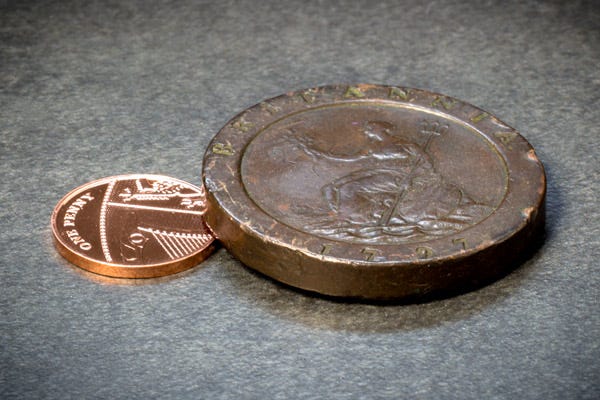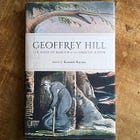But it fareth with sentences as with coins, they that in smallest compass contain greatest value are best esteemed; and in sentences, those that in fewest words comprise most matter, are most praised.
Lancelot Andrewes
I wasn’t intending to write a follow-up to last week’s post on why poets like coins:
But a reader — Michael Allen — kindly pointed me to a piece of prose that continued the subject so perfectly it seemed worth doing. The piece is Geoffrey Hill’s address of thanks on receiving the Truman Capote Award in 2009, and it begins like this:
Though not a true numismatist, I take pleasure in coins. One is instructed not to handle them with ungloved fingers, for fear of rubbing off the “luster” or “bloom”. Even so, I confess to enjoying them as objects. I would even carry one or two on long-haul flights […] where others might carry a lucky pebble as tactile comforters.
My favourite coin is probably the English “cartwheel” tuppence of 1797. It was what the experts call an “intrinsic value” coin; this is to say that it contained exactly two pennies’ worth of copper as the price stood at the date of its issue. It is not a pretty coin; it is indeed uncouth, thick, and with a circumference equal to that of a silver crown, a much more valuable and aesthetically pleasing coin.
At that time the English pound sterling contained two hundred and forty pence. Therefore £1.00 would comprise one hundred and twenty of these massive tokens; to carry £100.00 a person would probably need to use a pack-horse.
I am, in my approach to literature and literary criticism, an “intrinsic value” person. I try to imagine it as a palpable quality; if a poem or a prose passage succeeds, I tell myself, then one ought to be able to weigh it in a craftsman’s pair of scales. An objection can be raised that writers whom I revere and who proclaim intrinsic value — Ruskin and others — are in fact pursuing a phantom. The “cartwheel” tuppence of 1797 would itself have ceased to be an intrinsic value coin one day after its minting if the price of copper had shifted on the exchanges. It would seem then that I am deluded and in actuality intrinsic value cannot be weighed in literature, and that it is the thing most abhorrent to the “true” minters: a promissory note. I would concede that literature is in most cases little more than a set of promissory notes but insist that this is not so in every case. The good poem, the good piece of prose, is at once promissory note and its essential redemption.
[…]
In my perplexity, “intrinsic value” is a shorthand tag for acknowledging the writer’s inescapable engagement with the density of the medium.
Hill returned to the question of “intrinsic value” repeatedly in his critical prose. This speech — made a year after the publication of his Collected Critical Writings (2008) — is one of his most direct claims for it as a way of thinking critically about literature. My own feeling — a feeling I often have about Hill’s work — is that I disagree with the sentiment, but admire the way it has been said. I don’t think a poem can have the “palpable quality” of a metal coin, even if both can be carried onto long-haul flights as a kind of talisman. A poem doesn’t have to go into the tray at security: it’s a comforter for the mind, not a fidget-object for the fingers. So it’s a sleight of hand for Hill to show us such a coin as the image of “the good poem” — a classic conjuror’s “drop”.
Poems are words organised into sound patterns, not intricately minted small change. This is why we understand poetry as something that criticism can propose a new valuation for — and why there are no essays in defence of neglected 2ps.
But the criticism of poets is often idiosyncratically revealing of their own poetics. And it does seems to me that Hill’s own sound-patterning often has a “palpable quality” which, in combination with his meaning, can seem very “solid”. A classic attempt to describe this effect can be found in Vincent Sherry’s The Uncommon Tongue: The Poetry of Geoffrey Hill (1987). Discussing Mercian Hymns — Hill’s sequence about Offa, the Anglo-Saxon king, which I quoted last week — Sherry writes:
The strongest image of the word as substantial thing occur in the numerous references to the coins of Offa’s realm: with verbal inscriptions cut in silver, these picture the physical medium of language […] The analogy between coins and words, as things, as things of play, is struck ingeniously through the sequence. Coins frequently surface in passages featuring Hill’s own play with words as objects of sound.
Sherry then cites the poem’s image of a mole underground nudging a large Roman coin through the earth — or, as Hill puts it: “the mole / shouldered the clogged wheel, his gold solidus”. Here, Sherry comments, “the repeated sounds become substantial in the mouth”. He then turns to the phrase “Offa Rex resonant in silver”, and says: “the syllables rex and res vibrate against each other like coins struck together”.
I can follow Sherry’s first claim: the words seem “substantial in the mouth”, because the line emphasises the physical work of pronunciation, with the triple internal rhyme of “mole / shoul- / gol-” rolling the long vowel and liquid consonant between the plosive stopping points of the “d”, while “clogged” and “gold” perform a tongue-twisting anagram (and, more faintly, the sound of “shouldered” echoes into “solidus”). And I would also say the poetic “solidity” of the other phrase derives from a similar experience: the mouth has to draw close and then wide to pronounce “Offa Rex”, a pattern repeated with variation as “Rex” shifts slightly into “res”, and the short “o” and “a” vowels of “Offa” echo into “-onant”, followed by the fainter off(a)-rhyme of “silver”.
In both instances, the mouth is made to work in a way that makes us aware of how we produce words as sound. And this creates a precise physical experience which unfolds simultaneously with a precise description of the physical world. But the two things are not the same. “Resonant in silver”, if we stop to think about it, is a synaesthetic image: sight as sound, one sense translated into another. We may imagine that we hear “coins struck together” here, but the words are not onomatopoeically making that noise. What do hear, however, is something like Hill’s definition of “intrinsic value”: “the writer’s inescapable engagement with the density of the medium”. And for my money — so to speak — this is a more interesting thing to trace than the critical alchemy which would turn a poem into a bag of pennies for weighing at the bank.
Hill’s paragraphs about the cartwheel tuppence rang a bell in my head. I eventually tracked it down to his last, posthumous book of verse, The Book of Baruch by the Gnostic Justin (2019) — a deliberately “unfinished” final poem which contains some of the best things he ever wrote. The form is “prose poetry” of a unique kind: long lines that are also sentences and paragraphs, whose sense skips between frequent and ingenious internal rhymes. Here is the relevant passage, from a longer section set in the City of London (in the book, all lines are indented after the first right margin):
O, the Tower, O, the towering edifices of high finance, where old solid money becomes ferocity’s cladding in zigzag patterns glazed like faience.
[…]
When you say “old solid money”, what exactly do you mean?
I suppose that at heart I mean intrinsic value coin, such as the cartwheel tuppence of seventeen ninety-seven: not fit for purpose — folk would need sacks for purses; and the price of copper was of course variable. Too big, too heavy, for a small child’s hand; therefore a grand gift encouraging thrift. You could make it trundle-wobble on a deal-table. Together with a raggety peg-doll something in a child’s special dimension real.
This versification of the “cartwheel tuppence” speech condenses its central image while elaborating the solidity of the coin as a childhood pleasure, and framing it with the inspired rhyme-image of the modern towers of “high finance… glazed like faience”.
By turning his rhetorical concept of an “uncouth” coin with “intrinsic value” into a poetic image, Hill makes a symbol of what the poem itself is doing. Its loose, doggerel line risks being “not fit for purpose”; a sack instead of a purse; “too big, too heavy, for a small child’s hand”. But when the child’s hand enters the poem, the unloveliness of the coin, and the form, is redeemed: “a grand gift encouraging thrift” also serves as a description of the generative tension Hill sets up between a grandly rambling line and the narrow “thrift” of rhyme, and “make it trundle-wobble” the rhythm that results.
Like the copper cartwheel tuppence, this is not “resonant in silver”, but it still makes poetry out of “the density of the medium”. The double meaning of “deal-table”, for example, overlays the “deal” of high finance with the old-fashioned English term for cheap softwood furniture (cognate with modern Dutch deel, plank). “Deal” also gives Hill the rhyme-sound which allows him to close on the magical delayed word “real”:
Together with a raggety peg-doll something in a child’s special dimension real.
I don’t think “intrinsic value” is “real” in literature, but I do think the imaginative and verbal density of these lines make them a real piece of poetry, articulating the value of the “low” — the child, the coin, the deal-table — over the value of “high” finance, and turning the sounds of “doggerel” into something prized: “a raggety peg-doll”.
NOTES
You can read the full “cartwheel tuppence” speech by Hill here: https://www.jstor.org/stable/20722123?seq=1
I wrote about how Hill’s last poem contains many aphorisms on the nature of poetry here:
Hill returned to the idea of “intrinsic value” in the lectures he gave as Professor of Poetry at Oxford from 2010. For example:
Intrinsic value is perhaps only a figure of speech, but it is a meaningful figure of speech, and when one speaks today of a total destruction of intrinsic value, people generally know what you mean.
You can read the lecture to which this is the conclusion here, as part of Nik Prassas’ ongoing project to transcribe the online recordings:












The poem as “promissory note” reminds me of Transtrømer’s image of poetry as “inspired notes” of a different kind: https://andrewjshields.blogspot.com/2007/11/inspired-notes.html
Fascinating. I am reminded of a debate between Gide and St-John Perse in which the latter deplored the concrete nature of English and its desire to "reincarnate the thing itself". He thoughts the French words "like coins as values of monetary exchange", whereas English "was still at the swapping stage".
I am also reminded that the chap from Dante’s Inferno who turns up in the long epigraph to Prufrock, Guide da Montefeltro, was placed in hell for the crime of counterfeiting.